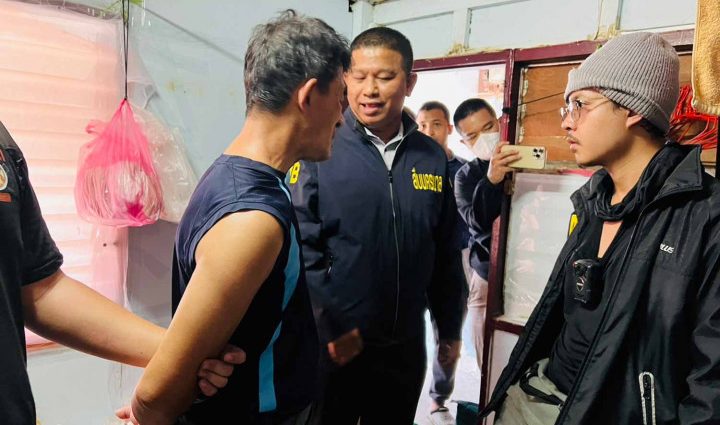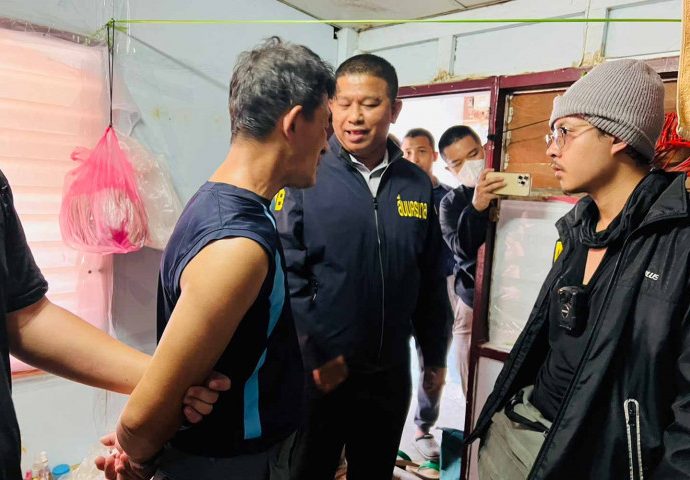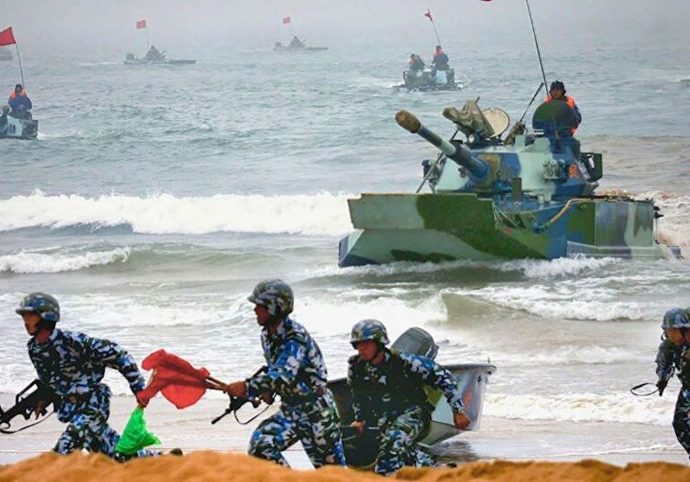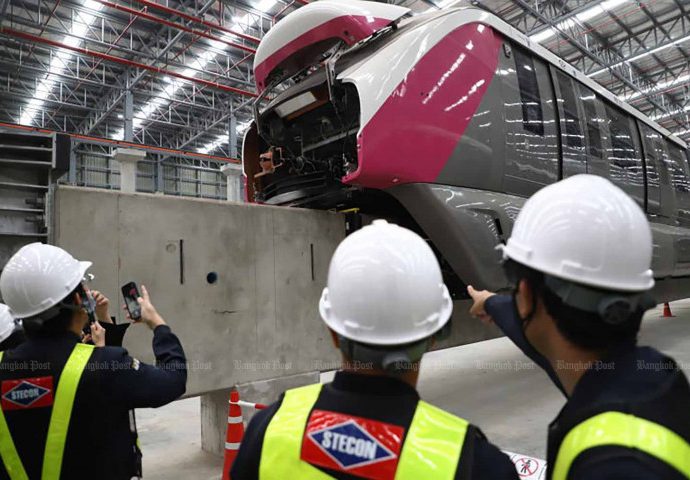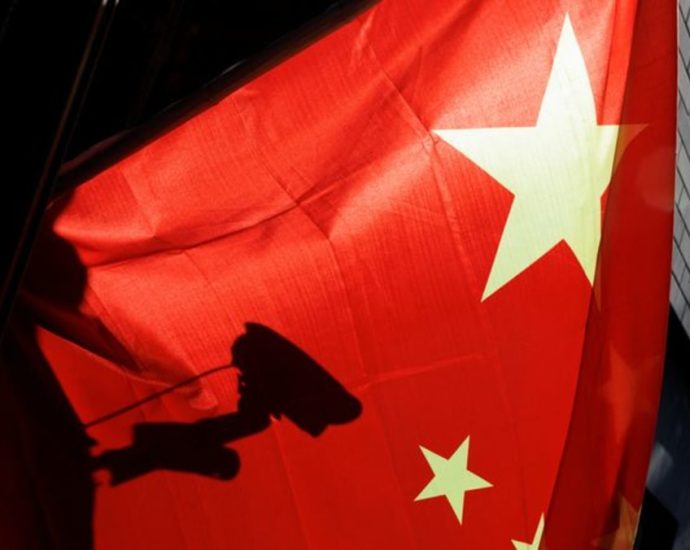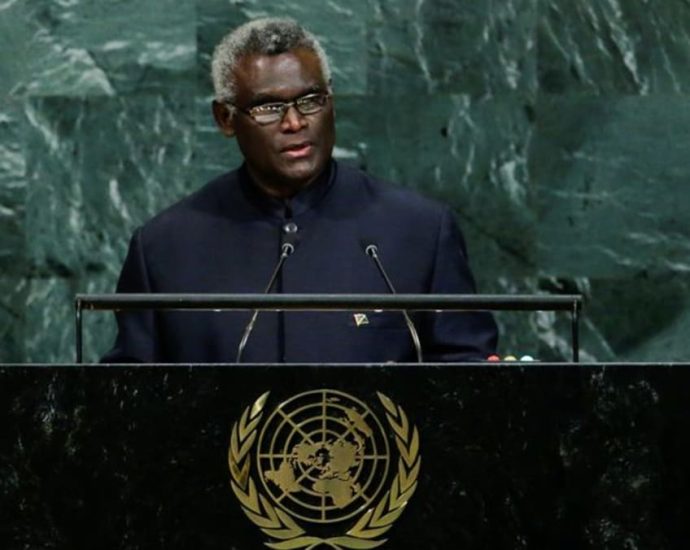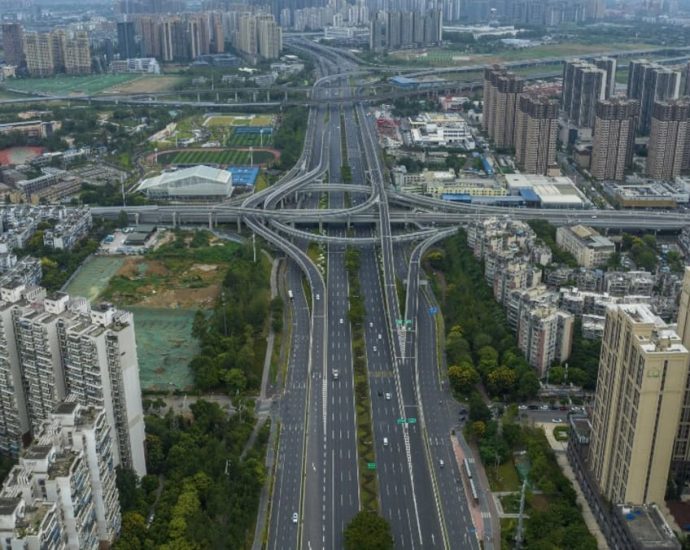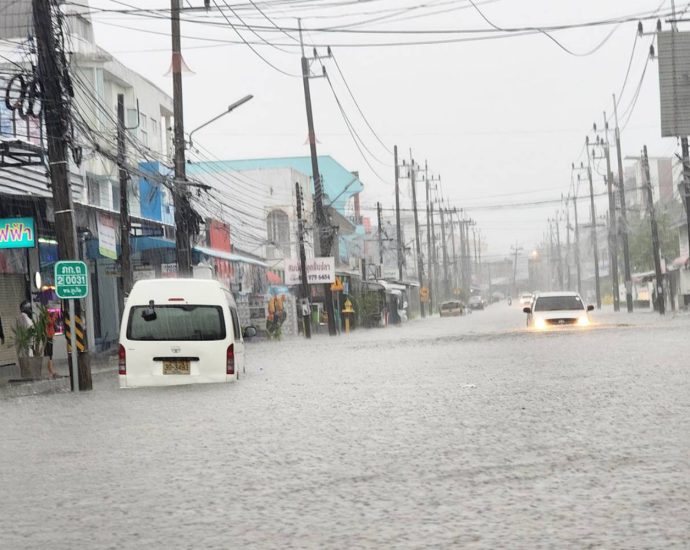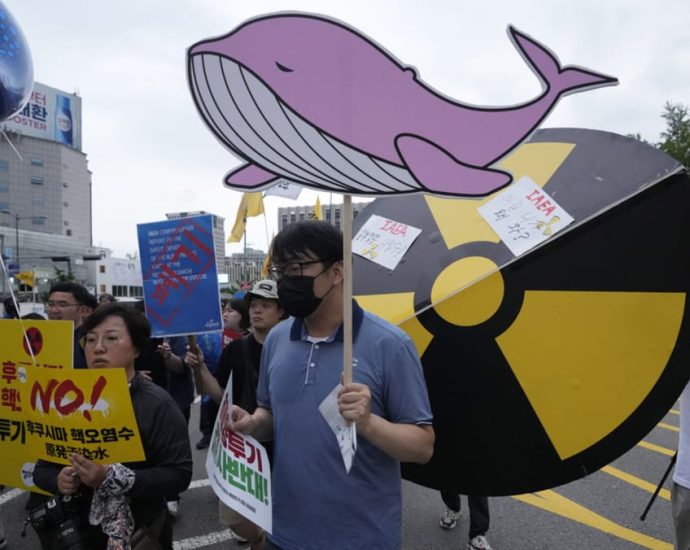Fake ‘transvestite’ nabbed for serial rape of aspiring models

Police in Bangkok have arrested a 60-year-old man who allegedly pretended to be a transvestite recruiting beautiful young women for modelling jobs and raped about 100 of them.
Pol Maj Gen Theeradet Thumsuthee, investigative chief of the Metropolitan Police Bureau, said Sonthichai Yusuparp was arrested in a room in a slum community in Dusit district on Saturday.
According to the chief, the man was wanted for rape under a warrant issued by the Criminal Court on June 27.
Sonthichai had been arrested for 14 cases of rape in 2015, when he told police he had raped at least 100 women. His victims included government officials, company executives and bachelor’s and master’s degree students. The man was released from jail on May 20 last year.
The rapist always pretended to be a transvestite who was looking for beautiful women at shopping malls on weekends to recruit them for show business. He then brought victims to hotels for “casting” but actually raped them there.
Before being arrested again on Saturday, Sonthichai used the same trick with a woman at a music school in a shopping mall in Lat Phrao area. There he called himself Bua and convinced the victim to bring him to her condominium. When unable to rape the victim, he fled.
Before the arrest, detectives were looking for the man at shopping centres in Bangkok for about two weeks. Finally spotting him, they had a plainclothes policewoman approach him by pretending to look for a job in the entertainment business.
From 1992 to 2009, the man worked as a construction worker, truck driver, production worker, security guard and curtain installer. He changed both jobs and residences in the capital.every 1-5 months.
In 2009 he got to know a person in show business and then pretended to be a transvestite who worked as a modelling agent, Pol Maj Gen Theeradet said.
Fake ‘transvestite’ nabbed for serial rape of wannabe models

Police in Bangkok have arrested a 60-year-old man who allegedly pretended to be a transvestite recruiting beautiful young women for modelling jobs and raped about 100 of them.
Pol Maj Gen Theeradet Thumsuthee, investigative chief of the Metropolitan Police Bureau, said Sonthichai Yusuparp was arrested in a room in a slum community in Dusit district on Saturday.
According to the chief, the man was wanted for rape under a warrant issued by the Criminal Court on June 27.
Sonthichai had been arrested for 14 cases of rape in 2015, when he told police he had raped at least 100 women. His victims included government officials, company executives and bachelor’s and master’s degree students. The man was released from jail on May 20 last year.
The rapist always pretended to be a transvestite who was looking for beautiful women at shopping malls on weekends to recruit them for show business. He then brought victims to hotels for “casting” but actually raped them there.
Before being arrested again on Saturday, Sonthichai used the same trick with a woman at a music school in a shopping mall in Lat Phrao area. There he called himself Bua and convinced the victim to bring him to her condominium. When unable to rape the victim, he fled.
Before the arrest, detectives were looking for the man at shopping centres in Bangkok for about two weeks. Finally spotting him, they had a plainclothes policewoman approach him by pretending to look for a job in the entertainment business.
From 1992 to 2009, the man worked as a construction worker, truck driver, production worker, security guard and curtain installer. He changed both jobs and residences in the capital.every 1-5 months.
In 2009 he got to know a person in show business and then pretended to be a transvestite who worked as a modelling agent, Pol Maj Gen Theeradet said.
China stoking incendiary doubt US would save Taiwan
China is ramping up its propaganda machine against Taiwan’s annual live-fire Hang Kuang Exercise scheduled for late this month, a bold show of force against Beijing’s stated “reunification” plans for the self-governing island.
This month, Reuters quoted several Taiwanese officials claiming that at least a dozen news reports from Chinese state media had framed Taiwan’s Han Kuang Exercise as an “escape rehearsal” for Taiwanese President Tsai Ing-Wen and US citizens on the island in the event of a Chinese invasion.
Reuters notes that such media reports first surfaced in May, with the information campaign believed to be organized by China’s Central Leading Group for Taiwan Affairs headed by President Xi Jinping and implemented by various government offices including the Taiwan Affairs Office in Beijing.
A Taiwanese official quoted by Reuters said that the campaign’s objective is to weaken public trust in and create panic around Taiwan’s leadership.
Taiwan’s Mainland Affairs Office said that China is always trying to “damage the prestige of our government, divide Taiwanese society and weaken the support of the international community,” adding that “the government will immediately clarify false information and use specific actions to show its determination to defend itself.”
The Han Kuang Exercise has been held annually since 1984, which includes computer simulations and live-fire exercises to test Taiwan’s readiness in the event of a Chinese invasion.
In April 2023, Asia Times reported that this year’s Han Kuang Exercise would include scenarios for breaking a Chinese blockade and defeating a Chinese amphibious assault, with a US-built computer system performing round-the-clock simulations of joint, combined and coalition operations.
It will also be the first iteration where Taiwan’s major international airport will be temporarily shut down during a simulation of repelling Chinese invaders.
Live-fire exercises will emphasize combat force protection, maritime interception, shielding of significant facilities such as seaports and airports, civil defense mobilization, air defense and countering an amphibious invasion.

Nonetheless, Han Kuang faces various limitations that will need to be addressed to better prepare Taiwan against a potential Chinese invasion. Critics point to Han Kuang’s limited scope, short timeframe and piecemeal nature, particularly in regard to civil defense scenarios.
Asia Times noted in May 2023 that Taiwan must field 360-400 fighters to defend against 700 People’s Liberation Army-Air Force (PLA-AF) jets stationed nearby the island. While periodic upgrades to Taiwan’s fighter fleet have enhanced its effectiveness, they likely haven’t been sufficient to counterbalance the PLA-AF’s greater size and presence.
Taiwan’s air force may also have a readiness problem, with barely half of its fighters believed to be operational. It would also take at least a week to move the jets into hardened shelters, a major weakness if China mounts pre-emptive air and missile attacks to destroy the jets on the ground.
Aging aircraft are also a concern as Taiwan’s F-16s and Indigenous Defense Fighters (IDF) were delivered in the 1990s, posing an obsolescence risk without corresponding upgrades.
Taiwan’s inability to acquire newer aircraft may put it at a long-term disadvantage versus the PLA-AF, with concerns over Chinese espionage precluding US F-35 sales to the Taiwan air foce.
Taiwan also faces a fighter pilot shortage, forcing it to lower entry standards for prospective pilots, recruit officers from other military branches for pilot training, and allow pilots trained on other jets to fly F-16s.
Han Kuang’s limited civil defense scenarios may prove to be a liability considering China’s extensive penetration of Taiwan’s military, with top-ranking Taiwanese officers known to have leaked classified and sensitive information to Chinese spies.
That leaked intelligence could help China with invasion preparations. It could also result in turncoat Taiwanese officers refusing to fight, misdirecting troops or even defecting outright when an invasion starts.
Chinese agents can also spearhead possible decapitation operations against Taiwan’s command and control, political and military leaderships.
While China may actively promote propaganda to undermine Taiwan’s will to resist, there may be some element of truth in its “escape plan” spin.
In December 2022, Asia Times reported on a possible US “scorched earth” strategy for Taiwan involving disabling or destroying the self-governing island’s strategic semiconductor factories and evacuating its top semiconductor engineers and scientists for refuge in the US in a worst-case scenario.
Such a strategy threatens to destroy Taiwan Semiconductor Manufacturing Company’s (TSMC) manufacturing facilities, which produce 55% of the world’s advanced chips used in everything from mobile phones to sophisticated military weapons and equipment.
The destruction of TSMC’s facilities would cripple China’s war effort and inflict quick and deep economic damage, undermining the legitimacy of the Chinese Communist Party not to mention torpedo the global economy.
If implemented, such a scorched earth strategy would raise hard questions about the US’ war capabilities and ability and commitment to defend its other regional allies like Japan, South Korea and the Philippines.
Disingenuously framing the Han Kuang Exercises may be part of China’s larger strategy to subdue Taiwan without force.
While China has long threatened Taiwan with punitive economic and military action, the threats have not dissuaded Taiwan’s leadership and population from hinting at or implying de facto or eventual independence.
In January 2023, Asia Times reported on China’s “smart deterrence” strategy, wherein its “intelligentized warfare” operating concept aims to seize control of the information domain to deter or manage a conflict.
China has also been honing its “cognitive domain operations” concept, which uses artificial intelligence (AI) to supercharge its previous public opinion and psychological warfare tactics.

China’s propaganda operations aim in part at stoking shaky public confidence in US security guarantees, potentially influencing Taiwan’s 2024 presidential election results towards pro-China candidates, alongside covert funding for the latter.
While Taiwan’s democratic survival is contingent on US military intervention, a 2022 Inkstick survey shows that among Taiwan’s “government workers,” which includes military service members, 70% have no confidence in a US intervention in the event of a Chinese invasion.
The same survey shows 53.8% of Taiwanese aged 20 and above believe there would not be a US military intervention on behalf of Taiwan, while only 36.3% said they do.
PM to inspect Pink Line’s progress Monday

Prime Minister Prayut Chan-o-cha will on Monday inspect the progress of the Pink Line, an elevated monorail train system under construction, prior to it going on a trial run, acting government spokesman Anucha Burapachaisri said.
The Mass Transit Authority of Thailand (MRTA)’s Pink Line (Khae Rai-Min Buri) is designed to link northern areas of Bangkok and Nonthaburi by connecting with five mass transit lines. It will be 34.5 kilometres long with 30 stations.
Gen Prayut will be accompanied on the trip by Interior Minister Anupong Paojinda, Prime Minister’s Office Minister Thanakorn Wangboonkongchana and Deputy Transport Minister Athirat Rattanaseth.
The prime minister and his entourage will arrive at the Min Buri station at about 1.30pm and listen to a briefing from the MRTA governor before inspecting the connection point with the Orange Line.
They will then board a train for a test run between Min Buri and Lat Pla Khao stations.
As of the end of June this year, Pink Line’s construction work was 96.97% complete and electrical system 97.34% complete. The line’s overall progress was 97.15%, Mr Anucha said.
According to a transport ministry source, Northern Bangkok Monorail Company Limited (NBM) has been granted a concession to operate the line.
NMB initially planned for Pink Line to go on a trial run in January before going in full service by June 2024.
However, the company recently said the line might be partly opened for service in late 2023, probably between Lak Si and Min Buri stations. But it was not yet clear when the trial run would take place, said the source.
China tamps down on gatherings providing harmful information
BEIJING: China is tamping down on meetings that provide false information and could harm citizens, state media said, as the authorities step up oversight on what they consider questionable activities in various areas. The Publicity Department of the Communist Party of China Central Committee and 10 other authorities issued aContinue Reading
Solomon Islands leader visits security partner China with focus on infrastructure
SYDNEY: Solomon Islands Prime Minister Manasseh Sogavare arrives in China on Sunday (Jul 9) for his first visit since striking a security deal, pledging to “remain neutral” amid rising China-US competition and prioritise his nation’s development needs. Western analysts said Sogavare would be feted after signing the security pact thatContinue Reading
China’s Chengdu bolsters power supply ahead of international games, looming heat
BEIJING: China’s Chengdu, capital of Sichuan province, is shoring up the city’s electricity supply for the FISU Summer World University Games later this month as power grids across the country get stretched to their limits due to sweltering heat. A power supply command-and-dispatch centre began operations in June for theContinue Reading
Phuket partly flooded, small vehicles stalled

PHUKET: Heavy rains caused flooding and paralysed traffic for small vehicles in this southern resort province on Sunday morning.
It was raining over about 80% of the tourist island and floodwater was deep in many areas on Sunday morning.
The affected areas included Khao Khat, Ao Yon, Phaniang Sam Kongnam, Tha Khraeng, Rai Foon, Dao Roong and Chaofa Sakdidet in Muang district where water levels were too deep for small vehicles to pass. Floodwater in these areas was at least 60 centimetres deep.
In Kathu district, heavy flooding occurred in Patong, Kathu and Kor Kathu areas.
The Meteorological Department predicted that along the western coast of the South including Phuket it would rain in 40-60% of areas from Monday to Wednesday and then 60-70% of all areas in the region on Thursday and Friday.
‘Absolutely logical’ Japan’s Fukushima water release draws interest: IAEA chief
A Democratic Party member who chairs a special committee on the issue said the IAEA’s findings had “shortcomings”, and the widespread public concerns over safety in the country were “legitimate and reasonable”. “We deeply regret that the IAEA concluded Japan’s plan to discharge contaminated water from the Fukushima nuclear powerContinue Reading
Majority believe 8-party alliance will succeed in pushing Pita for PM: Nida Poll

A majority of people believe that, with sincerity to one another, the eight parties forming a government will succeed in their push for Pita Limjaroenrat, the Move Forward Party leader, to be prime minister, according to an opinion survey by the National Institute of Development Administration, or Nida Poll.
The poll was carried out on July 5-7 by telephone interviews with 1,310 people aged 18 and over of various levels of education, occupations and incomes throughout the country to compile their opinions about sincerity of the Move Forward, Pheu Thai and six other smaller parties in forming a government and pushing for Mr Pita to take the prime minister’s post.
Asked about their satisfaction with Wan Muhamad Noor Matha of the Prachachart Party having been selected speaker of the House of Representatives, 45.50% were fairly satisfied; 37.40% highly satisfied; 9.54% not quite satisfied; 6.34% totally not satisfied; and 1.22% had no answer or were not interested.
Asked which between Move Forward and Pheu Thai parties would benefit more from Wan Muhamad Noor Matha’s being made House speaker, 58.93% said the two parties would equally benefit from it; 23.13% pointed to Pheu Thai; 7.94% pointed to Move Forward; 6.95% said neither of them would benefit from it, and 3.05% had no answer or were not interested.
Asked whether they believed the eight parties are sincere in joining hands to form a government, a majority or 55.27% said “yes” and the other side, 43.97%, said “no”. The rest, 0.76%, had no answer or not interested.
A majority, 64.80%, said they believed the eight parties would succeed in pushing for Mr Pita to be prime minister while 34.28% said otherwise. The rest, 0.92%, had no answer or were not interested.

